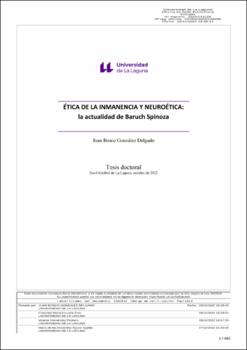Ética de la inmanencia y neuroética. La actualidad de Baruch Spinoza
Author
González Delgado, Juan BoscoDate
2022Abstract
Acercarse a Spinoza implica aceptar el reto de mover las propias ideas y abrir
paso al testimonio filosófico y vital de quien fue capaz de traspasar los
umbrales del miedo social para ir en pos de lo que esconden las apariencias.
El genio holandés no escatima en esfuerzos a la hora de proclamar el
desbaratamiento de la cultura y el pensamiento conocidos por falaces y
opresores, no ya de su época, sino de cualquier época, porque su pensamiento
es una filosofía del presente, hasta el punto de que podemos convenir en que
este gran olvidado hasta los inicios del siglo XX es hoy una reivindicación
necesaria.
La obra de Spinoza es, sin duda, el adelanto reflexivo a los hallazgos
que en campos tan amplios como la física, la biología, la psicología y las
neurociencias se han venido dando en los últimos cien años. Este trabajo
pretende, por ello, trazar puentes entre tales hallazgos y el propio Spinoza a
través de, sobre todo, su obra magna, Ética demostrada según el orden
geométrico, con el fin de afirmar su carácter precursor y, me atrevo a decir,
aún hoy revolucionario. Con esa intención, la ética spinozista se convierte
en un instrumento de valiosa eficacia y actualidad, ya que sus diversas
lecturas y su complejidad nos presentan caminos de comprensión para
cuestiones como la mente, la vida como fenómeno, las relaciones humanas,
las emociones, la psique, que, si bien pueden conducirnos a claridades
rotundas, también pueden despistarnos del tesoro que guardan sus
proposiciones, axiomas, lemas y definiciones.
Uno solo es el testimonio vital y filosófico de Baruch Spinoza: la
progresión desde la prisión de la mente condicionada hacia la plenitud
humana de la mente liberada. Dicho así parece una fórmula vacía, pero
cuando se indaga en el cómo, uno no puede más que asentir y asumir para sí
la responsabilidad que el holandés aplicó a su propia vida: la comprensión
es el medio; la apertura, la actitud debida; el entusiasmo, el efecto inevitable,
sobre todo cuando se alcanza la única conclusión posible: que Spinoza nos
mostró y demostró que todo es lo que es tal cual es y tiene su ser en lo mismo,
la sustancia, y que el ser humano, modo de esa sustancia, es, en su singularidad, valioso hasta el extremo, tanto como cualquier forma de vida,
como la mismísima vida a través de la cual la sustancia se manifiesta.
El logro final de este genio del siglo XVII está, como se verá, en haber
logrado describir la acción inconsciente del cerebro humano tres siglos antes
de que se articulara con sentido esa palabra: inconsciente. Reivindicar este
hecho es el motivo primero y último de este trabajo. Drawing closer to Spinoza implies accepting the challenge of altering one's
ideas and making way for the philosophical and vital testimony of someone
who was capable of crossing the thresholds of social fear in pursuit of what
appearances hide. The Dutch genius spares no effort in proclaiming the
disruption of cultures and thoughts considered fallacious and oppressive, not
only in his day, but throughout the years, because his thought is a current
philosophy, to the extent that we can agree that this great individual,
forgotten until the beginning of the 20th century, needs to be vindicated
today.
Spinoza's work is, without a doubt, the reflective precursor to the
findings that have been made over the last hundred years in fields as wideranging
as physics, biology, psychology and neurosciences. This paper
intends, therefore, to draw bridges between such findings and Spinoza
himself through, above all, his magnum opus, Ethics demonstrated in
geometrical order. The aim is to affirm its precursive and, I dare say, still
revolutionary character. With this intention, Spinoza ethics become an
instrument of valuable effectiveness and topicality, since its diverse readings
and its complexity present us with paths of understanding for questions such
as the mind, life as a phenomenon, human relations, emotions and the
psyche. Although they can lead us to resounding clarities, they can also steer
us away from the treasure of its propositions, axioms, slogans and
definitions.
Just one of these is the vital and philosophical testimony of Baruch
Spinoza: the progression from the prison of the conditioned mind to the
human entity of the liberated mind. Put like that, it sounds like an empty
formula, but when one looks into the means, one can only agree and adopt
for oneself the responsibility that the Dutchman applied to his own life. In
other words, understanding is the means; openness, the correct attitude;
enthusiasm, the inevitable effect, especially when the only possible
conclusion is reached. That is that Spinoza showed and proved to us that
everything is what it is as it is and has its being in the same, in the substance,
and that the human being, the mode of that substance, is, in its uniqueness,





